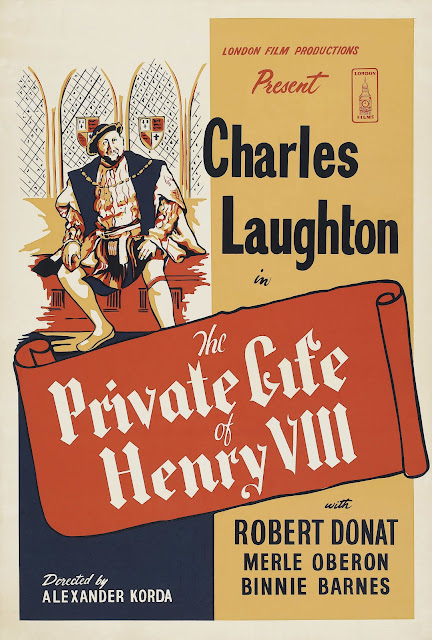Welcome back to the Oscar Film Journal, here at Enuffa.com! This year's Academy Award nominations are imminent, so it's time to start bingeing Best Picture nominees once again.
Today I'm traveling back to 1933 England for a satire of sorts, The Private Life of Henry VIII, starring Charles Laughton in the role that put him on the map, along with his wife Elsa Lanchester, one year before her star-making performance as The Bride of Frankenstein. TPLOH8 (as I'll be calling it to save time) is a rather comedic look at the infamous 16th century monarch and his string of marital failures, depicted in tongue-in-cheek fashion, with Laughton playing the decadent, gluttonous king as a short-tempered buffoon without a grown-up attention span.
We jump into the story during his second marriage, as his first to Catherine of Aragon "contained no particular interest" and ended in uneventful divorce. At the film's start Henry is married to Anne Boleyn, whom he's ordered executed for infidelity - by all accounts she was falsely accused and the charges were a pretense to free Henry up to marry Jane Seymour, portrayed in the film as a youthful, simple woman who wasn't going to cause him any trouble. Seymour of course died in childbirth and the country later clamored for Henry to remarry; we get multiple scenes of the king's servants and cooks gossiping about his love life and Henry himself hemming and hawing about what he should do next. For political reasons he courts German princess Anne of Cleves (Lanchester in a very funny performance), who has no interest in Henry and makes herself as unappealing to him as possible, using their brief marriage to achieve her own political ends. Finally after the dissolution of his fourth marriage, Henry settles on Katherine Howard, a woman from his court, whom he'd had designs on for years. Katherine values advancement above all else and their marriage seems a convenient arrangement for both partners, but gradually she learns that a loveless marriage is also a joyless one, and falls in love with Thomas Culpepper. Henry executes both of them and ends up marrying a domineering shrew, Catherine Parr, with whom he remained until his death.
TPLOH8 was a critical and commercial success upon its release and was in fact the first British-made film to earn a Best Picture nomination and the first to win any Oscar - Laughton deservedly won for his bombastic, tragically comic portrayal. It was also responsible for much of the imagery and personality traits we associate with Henry VIII, though historians dispute many of those tropes, and the narrative is only loosely based on historical fact.
But the film is an amusing look at the narcissistic ruler and the various women in his life. Laughton has a lot of fun in the role, while his big scene with Lanchester steals the show. Binnie Barnes as Katherine Howard is sympathetic, initially there just to gain the title of Queen, but eventually displaying tenderness toward Henry in spite of not being in love with him, and later developing real feelings for Culpepper. The other supporting characters aren't given much screen time to make an impression; Laughton carries most of the show on his own, his performance strong enough to make up for the film's limited running time.
Overall TPLOH8 is an amusing little historical satire, a bit clunky due to the technological constraints of early-30s talkies, but very well-acted and with capable art direction. It's easy to see why Laughton and Lanchester would become stars and also why this particular portrayal of Henry VIII would be such a lasting one.
I give the film *** out of ****.


No comments:
Post a Comment